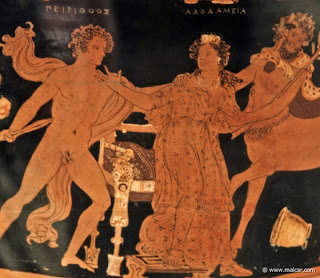A few notes on the context for Metamorphoses book 12:
Ixion, notorious fellow and begetter, one way or another, of the Centaurs:
Ixion married Dia, daughter of Eioneus 5; but since the groom would not hand over the gifts of wooing to his wife, Eioneus 5 took his mares as security for these. Ixion then summoned his father-in-law to his home, promising him to comply in every respect; but when Eioneus 5 arrived, he cast him into a pit which he had filled with fire, thus killing him. By Dia, Ixion became father of Pirithous and Phisadie, a woman who was given in servitude to Helen by the DIOSCURI (see also CONSTELLATIONS). But, having committed an enormous crime against a relative (for some have said that Ixion was the first to stain mortal men with kindred blood), there was no one in the world willing to purify him, except Zeus himself, who out of pity, cleansed him at last.
The Cloud
But then, ungrateful Ixion fell in love with Hera, and made advances to her. And Zeus, having heard Hera's report on this matter, made a Cloud Resembling Hera (Nephele 1) so as to confirm his wife's words by deluding the man's temerity. This is how Ixion lay with a cloud; and believing that he had enjoyed Hera's love, he went around boasting that he had slept with the goddess. From the union of Ixion with the Cloud, some say, the CENTAURS were born; but others say instead that Centaurus was born
"without the blessing of the Graces" (Pindar, Pythian Odes 2.46).
... and that this monstrous offspring later mated with mares, from whom the CENTAURS were born.
How Pelops won Hippodamia 3
Pirithous defending his bride, Hippodamia 4, from Centaurs
The suitors of Helen - busloads of them.
The oath of Tyndareus. Tyndareus was the husband of Leda. After the Swan visited her and Helen had become a beautiful young woman, he took advice from Odysseus on how to handle the question of her myriad suitors. Note how the fate of Odysseus (via his marriage to Penelope, daughter of Icarius, brother of Tyndareus) is intertwined with his scheme to protect the integrity of Helen's marriage:
War threatened again when SUITORS came from many kingdoms of Hellas to compete for the hand of Helen. And Tyndareus, seeing such a multitude, feared that choosing one of them might provoke the others to start quarrelling. Noticing his plight, Odysseus (who was among the SUITORS) promised that if Tyndareus would help him to win the hand of his niece Penelope (daughter of Icarius 1), he in return would reveal a way by which any trouble could be prevented. Tyndareus accepted the bargain, and Odysseus told him to exact an oath from the SUITORS that they should defend and protect the one chosen as Helen's husband against any wrong done against him in regard to his marriage. This is how the curse known as "The Oath of Tyndareus" came about—the SUITORS being sworn by the king, and Odysseus receiving Penelope from a reluctant Icarius 1.
[For it is told that Icarius 1 tried to make the couple settle in Lacedaemon. And when he could not persuade them, and they set forth to Ithaca, he followed their chariot begging her daughter to stay. Finally, as Odysseus could no longer endure so much fatherly love and devotion, he bade Penelope either to come with him willingly, or else go back with her father to Lacedaemon, if she so preferred. She did not reply but indicated, by covering her face with a veil, that she wished to depart with her husband. The Oath of Tyndareus proved to be a curse also for its inventor. Odysseus remained bound to the oath he himself had conceived, and when time came he was forced to go to war. Furthermore, an oracle had declared that if he sailed to Troy he would be away twenty years, and he would lose everything. So, being reluctant to join the alliance, Odysseus feigned madness, but Palamedes, seeing through the deception, forced him to desist and join.]
The ceremony of the oath was performed in a place later called "The Tomb of the Horse," on the road from Sparta to Arcadia. For before administrating the oath to the SUITORS, Tyndareus sacrificed a horse, and after they had been sworn standing upon the pieces of the horse, the animal was buried in the same place. The Oath of Tyndareus had the value of a defence pact, for later, when the seducer Paris came to Sparta and abducted Helen taking her to Troy, the oath was invoked by her husband Menelaus and his brother Agamemnon in order to force the kings of Hellas to join the coalition that sailed against Troy in order to demand the restoration of both wife and treasures.
Short version of the Oath story:
Odysseus promised to solve the problem in a satisfactory manner if Tyndareus would support him in his courting of Penelope, the daughter of Icarius. Tyndareus readily agreed and Odysseus proposed that, before the decision was made, all the suitors should swear a most solemn oath to defend the chosen husband against whoever should quarrel with the chosen one. This stratagem succeeded and Helen and Menelaus were married.




No comments:
Post a Comment